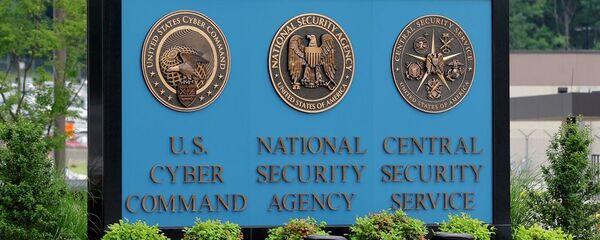WASHINGTON (Sputnik) — On November 29, the NSA ended its bulk data collection program which allowed the agency to intercept and store US citizens’ phone records metadata, as authorized by Section 215 of the USA Patriot Act, which was passed in the wake of the September 11, 2001 terror attacks on the United States.
These provisions were replaced by the USA Freedom Act, signed by President Barack Obama in June, which halted NSA warrantless data collection, transitioned authority back to telecom companies and provided transparency into the decisions of the secret Foreign Intelligence Surveillance Court (FISA Court).
"Enactment of this legislation will strengthen civil liberty safeguards and provide greater public confidence in these programs," Obama said in a press release.
US Congress, however, granted the NSA in the USA Freedom Act a six-month grace period to finalize the collection of telephone metadata, a provision that only intensified the legal standoff between proponents and detractors.
War on Terror
In the wake of the terrorist attacks in Paris on November 13, US lawmakers began calling to resurrect the NSA bulk collection program before it even ended, as detractors claimed the program actually made the United States less safe.
On December 11, shortly after the San Bernardino, California attacks that killed 14 people, US Senators Tom Cotton, Marco Rubio and Joni Ernst called for enhancing US intelligence gathering tools and criticized the Obama administration’s decision to end the NSA bulk collection program.
Critics of the NSA metadata collection program have argued there’s not a shred of evidence to prove the program has protected US national security.
"We’ve studied this issue and we found that the bulk data collection program didn’t catch any terrorists and didn’t prevent any attacks," US Senator Rand Paul told MSNBC in early December.
Paul added that collecting the phone metadata of US citizens had made the country more prone to terror attacks because the government was "getting lost in the haystack" of records.
On November 30, NSA whistleblower Bill Binney told Sputnik that the US government ought to reduce funding for the intelligence community after every terrorist attack, like the one in Paris.
"Every attack has been used to justify more money and more collection since September 11… the problem is: they continue to fail with bulk collection," Binney said. "What we should do is cut their budget every time they fail. Why reward failure?"
War Over the US Constitution
Court battles raged throughout 2015 over the constitutionality of the NSA bulk collection program, despite the fact it was supposed to shut down by the end of the year.
Not only did legal clashes ensue between the government and advocacy groups, like the American Civil Liberties Union (ACLU), but a war also broke out among US federal courts, particularly over the aforementioned USA Freedom Act six-month grace period.
On May 7, a US federal appeals court ruled that the NSA’s mass surveillance program exceeded the scope of what the US Congress had authorized under Section 215 of the Patriot Act.
US Senator Ron Wyden, one day after the FISA ruling, took to Twitter to denounce the FISA court and the Obama administration, accusing both of "violating Americans’ rights for five extra months is wholly unnecessary."
On November 9, US Circuit Court Judge Richard Leon issued a court injunction demanding that the US federal government shut down the NSA program immediately because it violated the constitution.
Advocacy groups saw the decision as largely symbolic in light of the fact the NSA program was ending in a matter of weeks.
Snowden's Legacy
The NSA telephone metadata bulk collection program was first revealed in 2013 by whistleblower Edward Snowden, who leaked some 1.7 million classified documents on the mass surveillance programs operated by US intelligence agencies.
The Snowden revelations triggered calls to curtail the NSA’s domestic spy program which eventually led to the USA Freedom Act, although privacy advocates have complained that the legislation does not go far enough to rein in the NSA’s widespread surveillance powers.
On June 4, Snowden himself warned that while the legislation represents a historic victory for every US citizen, the NSA is partnering with the world’s most popular online services, technology companies are being pressured to work against their customers while billions of cellphone location records and internet users’ metadata are still being intercepted indiscriminately.
"Though we have come a long way, the right to privacy — the foundation of the freedoms enshrined in the United States Bill of Rights — remains under threat," Snowden said in a New York Times opinion-editorial page.
Some are more hopeful, such as ACLU Staff Attorney Alex Abdo, who told Sputnik in November that Judge Leon’s court decision earlier that month represents "the latest judicial step in a slow shift away from the emergency mentality that has come to define our country’s post-September 11 period."
However, as the NSA program was winding down, former White House National Security Council advisor Gwenyth Todd told Sputnik that the court cases, the USA Freedom Act and legislative changes will have little impact on the scope of government surveillance powers.
"The NSA and other western governments are going to continue collecting as much information as possible, regardless of legislation," Todd said.
She added, the intelligence agencies may have to find other sources to point toward if they act upon information illegally obtained, but doing so is not difficult.



